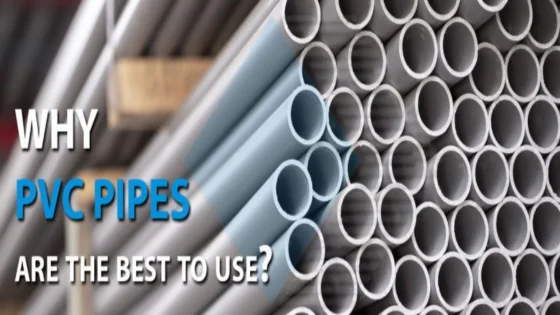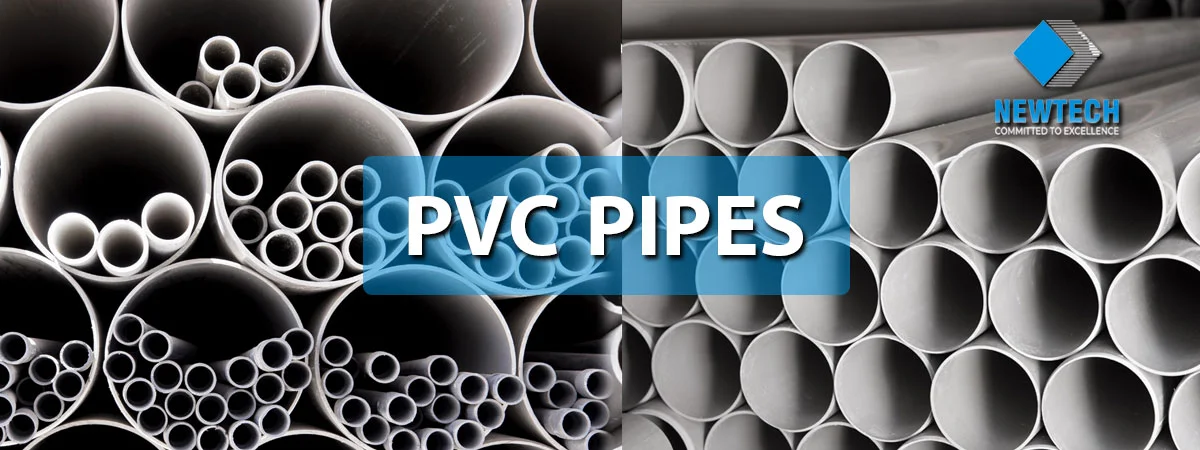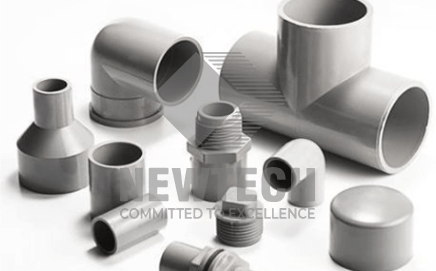Why PVC Pipes Are the Best to Use?

What are PVC Pipes?
PVC pipes are made of polyvinyl chloride, a type of plastic. They are safe, durable, and cost-efficient. PVC pipes have many benefits that make them the best choice for various applications.
PVC pipes are non-toxic and do not release any harmful chemicals into the environment. They are also relatively easy to install and require little maintenance. PVC pipes are also resistant to corrosion and can withstand high temperatures, making them ideal for use in hot climates.
PVC pipes are a cost-effective solution for many projects. They are often less expensive than metal or concrete pipes, and they can be used in a variety of applications.
Why PVC Pipes are the Best to Use?
- PVC pipes are sustainable and recyclable.
- They have a unique combination of properties: safety, durability/cost-efficiency, environmental performance, and recyclability.
- PVC pipes are used in a wide variety of piping applications, from the transportation of drinking water over drainage solutions to advanced fire-sprinkler systems.
Features of PVC Pipes
PVC pipes are a popular choice for piping applications due to their many benefits. Some of the key reasons why PVC pipes are the best to use include:
- They are safe: PVC pipes are non-toxic and do not release harmful fumes, which makes them ideal for transporting drinking water and other liquids.
- They are durable: PVC pipes are strong and resistant to cracking, making them a cost-effective option for long-term use.
- They are sustainable: PVC is made from recycled materials, making it an environmentally-friendly choice.
They are recyclable: When PVC pipes reach the end of their life cycle, they can be recycled into new products, making them a sustainable choice.
PVC pipes are durable & cost-efficient, sustainable, and recyclable

PVC pipes are used in a wide variety of piping applications, from the transportation of drinking water over drainage solutions to advanced fire-sprinkler systems. This popularity owes to a unique combination of properties: safety, durability/cost-efficiency, environmental performance, and recyclability.
When PVC pipes reach the end of their life cycle, they can be recycled into new products, making them a sustainable choice.
Things to Avoid during PVC pipe fitting
When installing PVC pipes, there are a few things to avoid to ensure a proper fit and avoid potential problems:
- Avoid using excessive force when fitting the pipes together. This can cause the pipe to crack or leak.
- Make sure the pipes are completely clean and free of debris before fitting them together. Any dirt or dust can cause the seal to break.
- Avoid twisting or bending the pipes when fitting them together. This can cause them to crack or deform.
By following these simple tips, you can ensure a proper fit and avoid common problems with PVC pipe installation.
PVC pipes are the best for the environment
PVC pipes are made of polyvinyl chloride, a type of plastic. It is one of the most popular choices for piping materials as it is durable, cost-effective, and environmentally friendly. PVC is made from recycled materials, making it an environmentally responsible choice. When PVC pipes reach the end of their life cycle, they can be recycled into new products, making them a sustainable option. PVC pipes are also non-toxic, making them a safe choice for transporting liquids. PVC pipes are a popular choice for piping applications due to their many benefits and environmentally friendly features.
PVC pipes are recyclable and increasingly recycled
The recycling of PVC began on a small scale in the early 1990s in Japan.
- In 2002, the Vinyl Institute—the trade association representing the PVC industry in the United States—launched a formal recycling program called “PVC Pipe Plus.”
- The goal of the program is to increase the recycling of post-consumer PVC pipes and to make it easier for consumers and recyclers to identify and recycle PVC pipes. Today, several companies recycle post-consumer PVC pipes.
- The recycling process begins by sorting the PVC pipe into different colors—white, black, green, and blue.
- The pipes are then cleaned and cut into small pieces, which are melted down and formed into new PVC pipes.
- The recycling of PVC is still in its early stages, but it is growing rapidly. In 2002, the Vinyl Institute reported that only 2 million pounds of post-consumer PVC pipe were recycled.
- By 2014, that figure had grown to more than 220 million pounds.
- The growth of PVC recycling is due to several factors, including the increased use of PVC pipes in construction and the rise in global awareness of the importance of recycling.
FAQs PVC Pipes
What are PVC pipes?
PVC pipes are made of polyvinyl chloride, a type of plastic. It is one of the most popular choices for piping materials as it is durable, cost-effective, and environmentally friendly. PVC is made from recycled materials, making it an environmentally responsible choice. When PVC pipes reach the end of their life cycle, they can be recycled into new products, making them a sustainable option. PVC pipes are also non-toxic, making them a safe choice for transporting liquids.
Why are PVC pipes a popular choice for piping applications?
PVC pipes are a popular choice for piping applications due to their many benefits and environmentally friendly features. PVC pipes are durable, cost-effective, and environmentally friendly. They are made of recycled materials and can be recycled into new products when they reach the end of their life cycle. PVC pipes are also non-toxic, making them a safe choice for transporting liquids.
Are PVC pipes recyclable?
Yes, PVC pipes are recyclable. In 2002, the Vinyl Institute—the trade association representing the PVC industry in the United States—launched a formal recycling program called “PVC Pipe Plus.” The goal of the program is to increase the recycling of post-consumer PVC pipes and to make it easier for consumers and recyclers to identify and recycle PVC pipes. Today, several companies recycle post-consumer PVC pipes. The recycling process begins by sorting the PVC pipe into different colors—white, black, green, and blue. The pipes are then cleaned and cut into small pieces, which are melted down and formed into new PVC pipes.
How much PVC pipe is recycled?
In 2002, the Vinyl Institute reported that only 2 million pounds of post-consumer PVC pipe were recycled. By 2014, that figure had grown to more than 220 million pounds. The growth of PVC recycling is due to several factors, including the increased use of PVC pipes in construction and the rise in global awareness of the importance of recycling.

Why is PVC recycling important?
PVC recycling is important because it helps reduce the environmental impact of PVC production. PVC pipes are made of polyvinyl chloride, a type of plastic that is not biodegradable. When PVC pipes reach the end of their life cycle, they must be disposed of in a landfill. However, by recycling PVC pipes, we can reduce the amount of plastic that ends up in landfills. Recycling also helps conserve natural resources and reduces energy consumption. PVC recycling is important because it is good for the environment and helps protect our planet’s resources.
What are the benefits of using PVC pipes?
There are several benefits to using PVC pipes, including:
- Durability: PVC pipes are strong and can withstand pressure from liquids and gases.
- Cost-efficiency: PVC pipes are often more cost-effective than other piping materials.
- Environmental performance: PVC pipes are made of recycled materials and can be recycled into new products. They are also non-toxic, making them a safe choice for transporting liquids.
- Sustainability: PVC pipes are a sustainable option as they can be recycled into new products when they reach the end of their life cycle.
- Recyclability: PVC pipes can be recycled into new products, making them a sustainable option.
Choosing PVC pipes for your piping needs offers a myriad of benefits, including durability, cost-efficiency, and environmental sustainability. PVC pipes, made from polyvinyl chloride, are renowned for their strength and resistance to corrosion, making them an ideal choice for various applications. Moreover, their recyclability ensures minimal environmental impact, contributing to a greener future. With the ability to be recycled into new products, PVC pipes offer a sustainable solution that aligns with eco-conscious practices. Whether for residential, commercial, or industrial use, opting for PVC pipes not only ensures reliable performance but also demonstrates a commitment to environmental stewardship.

